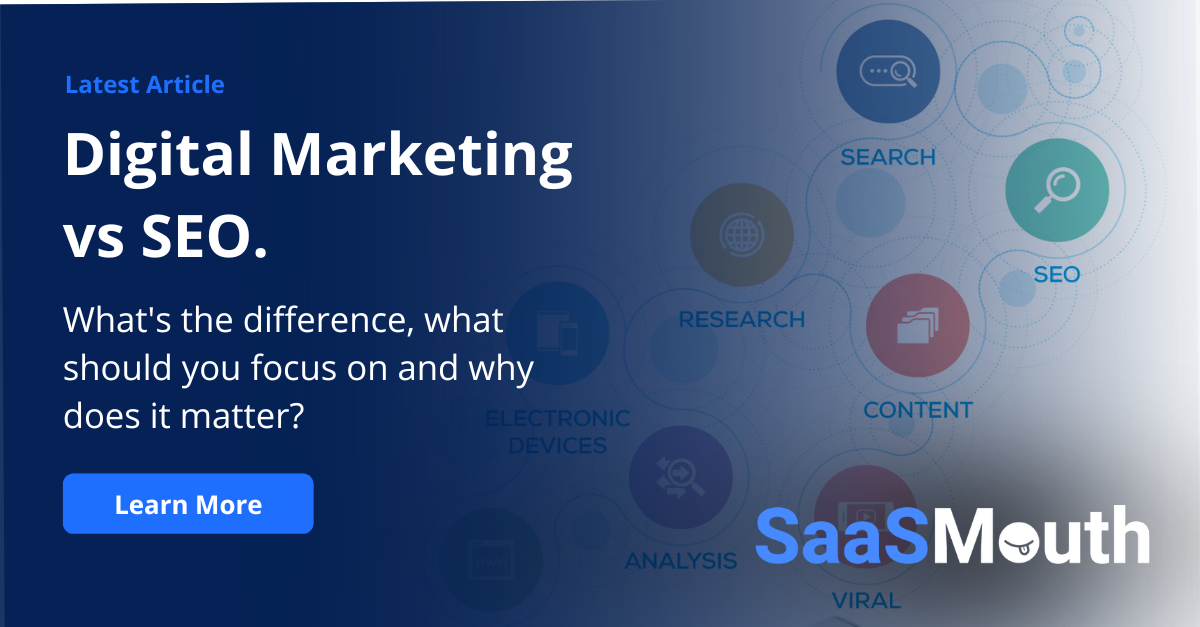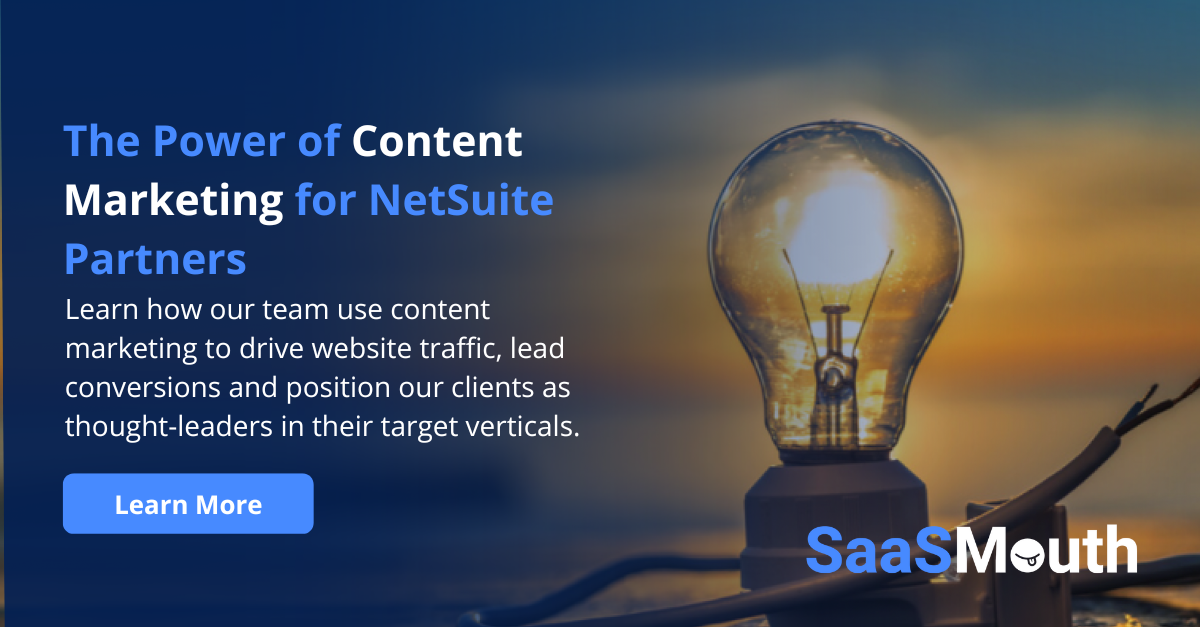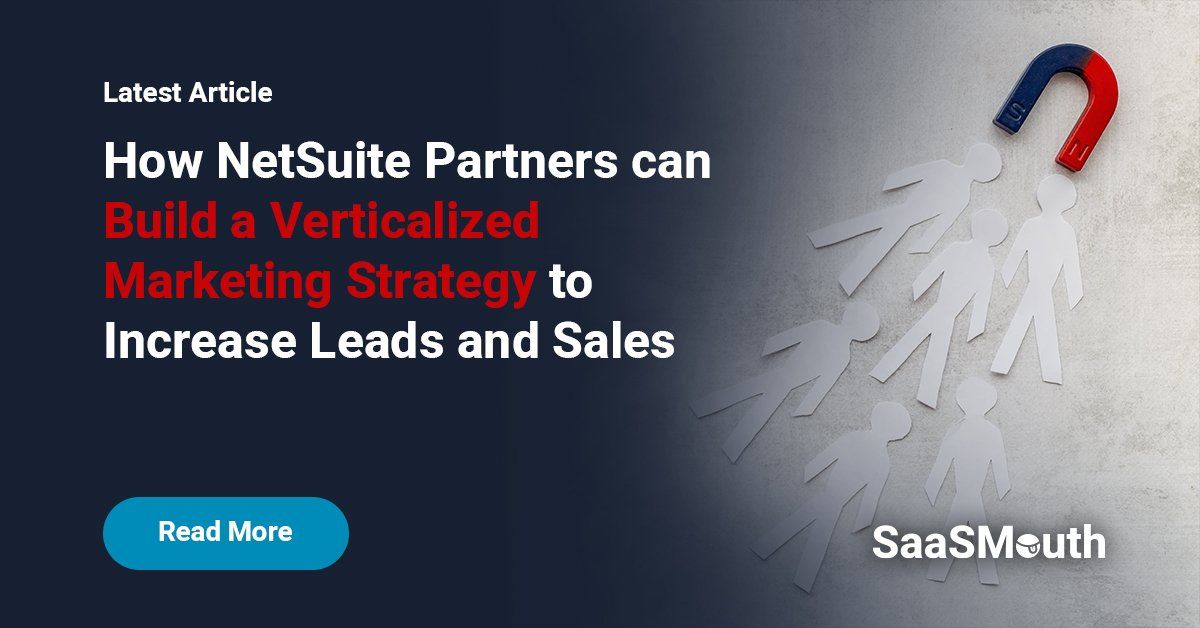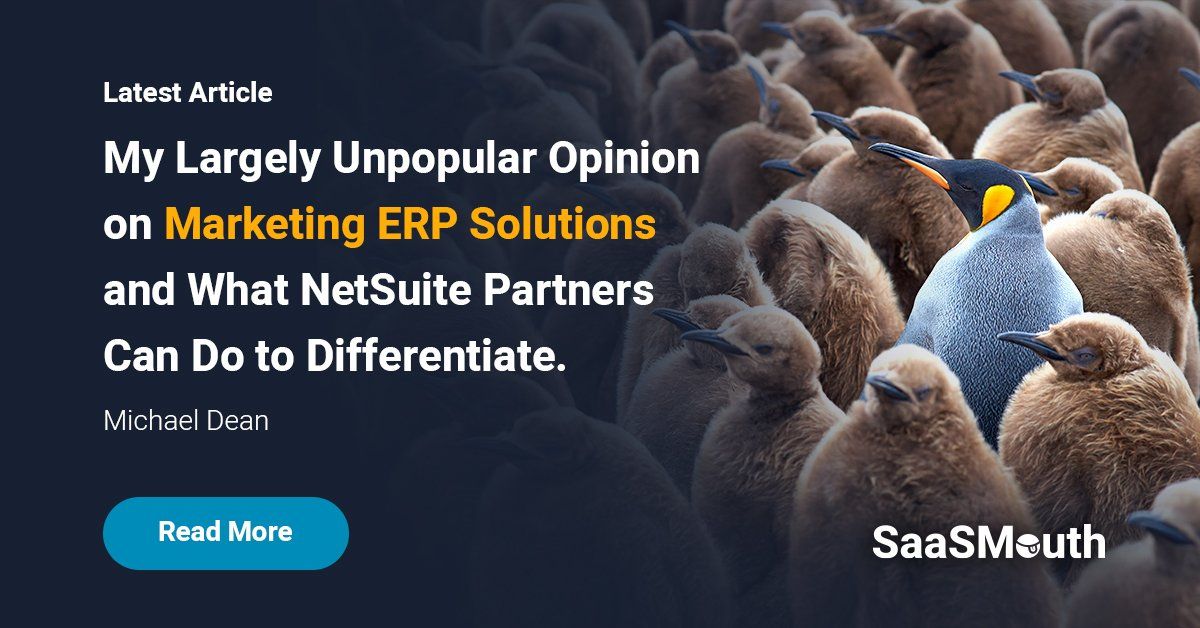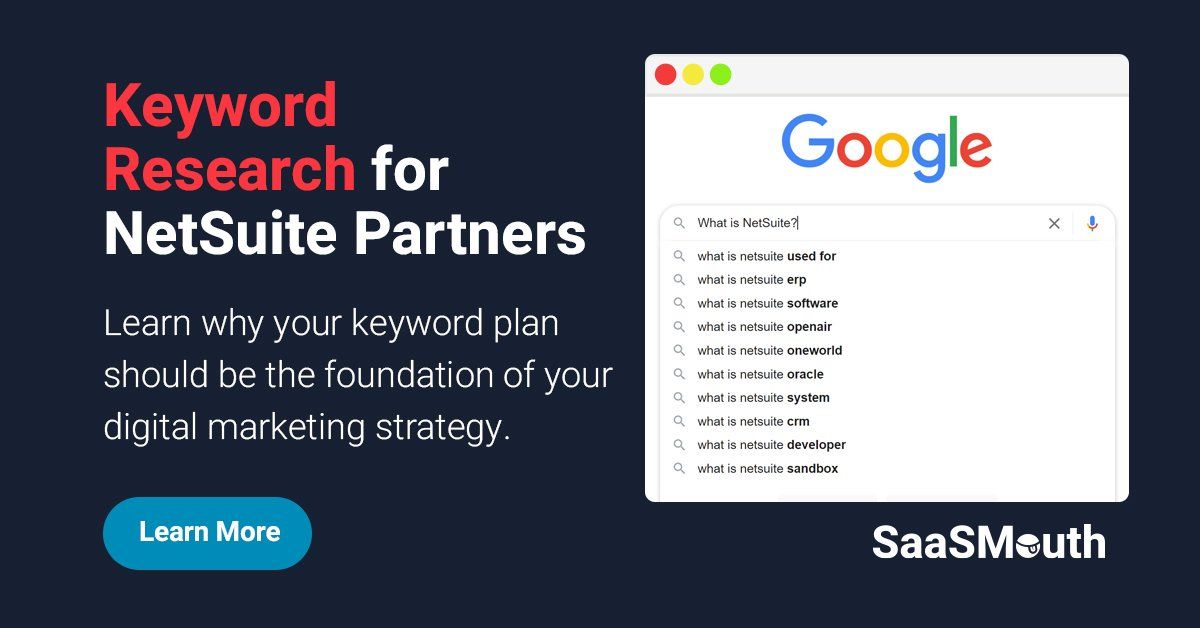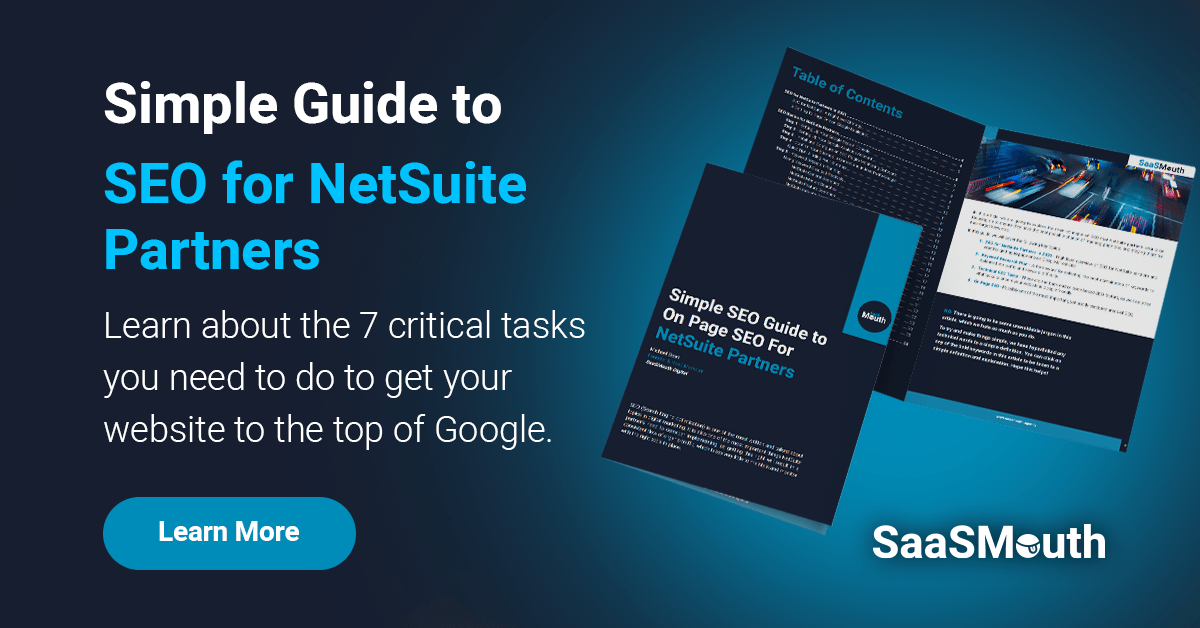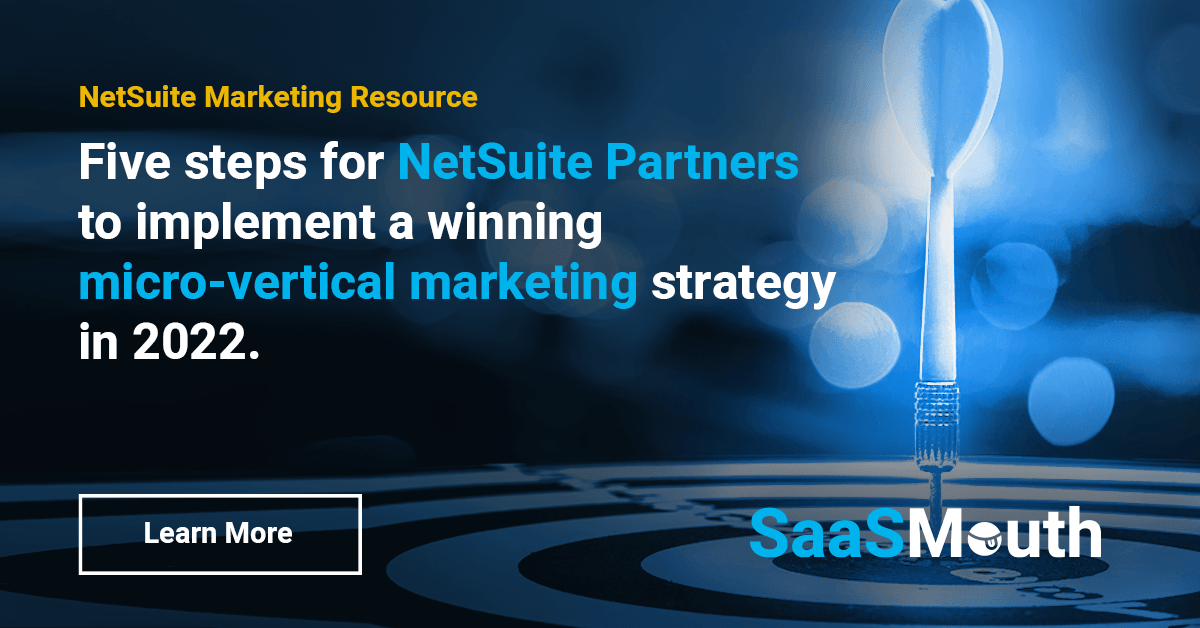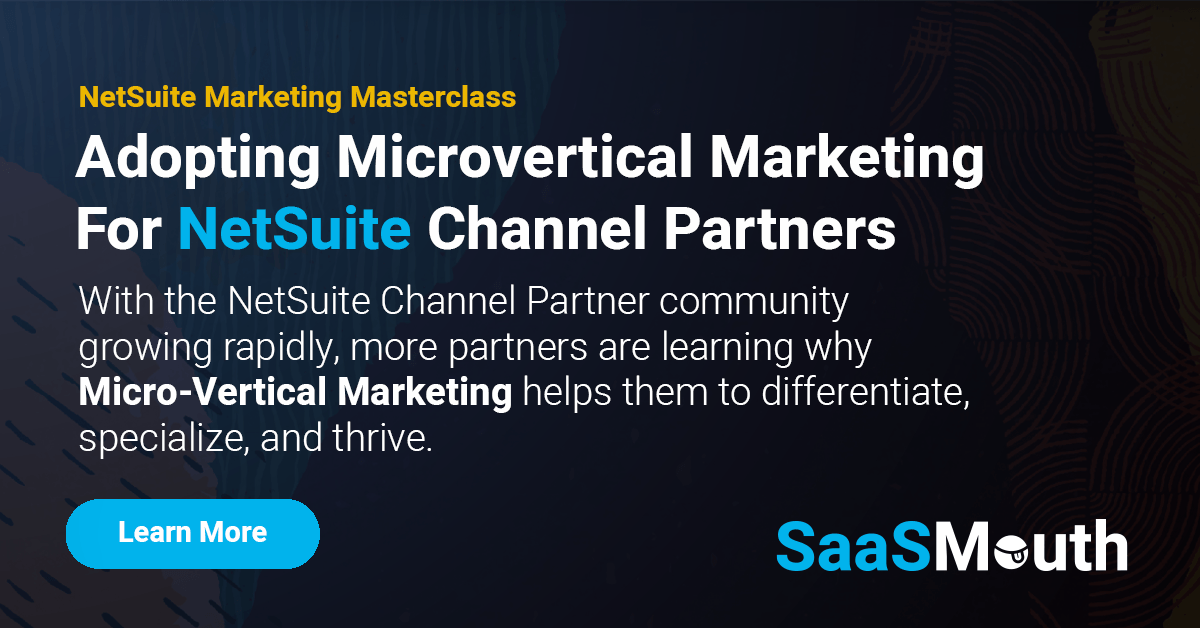The Truth About Content Marketing for NetSuite Partners
In 2022, the content marketing industry is expected to turnover US $70 billion, which will triple by 2028. And for NetSuite partners, it’s an essential piece of their puzzle when it comes to implementing marketing strategies to grow their business and attract new leads.
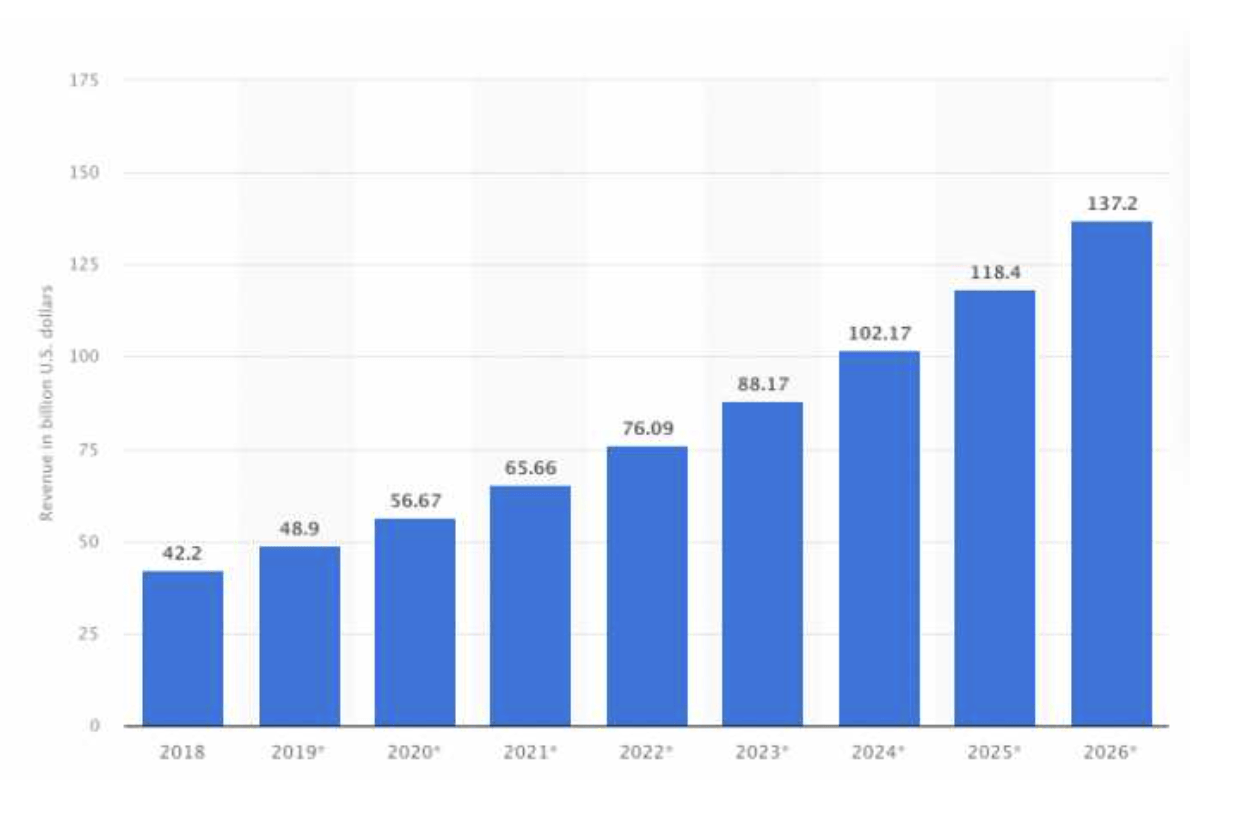
But what exactly is content marketing? And how can NetSuite partners use it to their advantage?
In this article, we’ll look at the truth about content marketing for NetSuite partners, what it is, how it can help you grow your business, and some top tips on getting started.
So, let’s get into it!
What Is Content Marketing?
Content marketing is creating and sharing online material (such as blogs, articles, posts, videos, infographics, etc.) that seeks to promote the features and benefits of a brand, product, or service in a way that is educational, informative, and captivating.
It’s an effective way to build relationships with potential customers and create a positive brand association. And when done correctly, it can be an extremely powerful tool for NetSuite partners looking to attract new leads and grow their business.

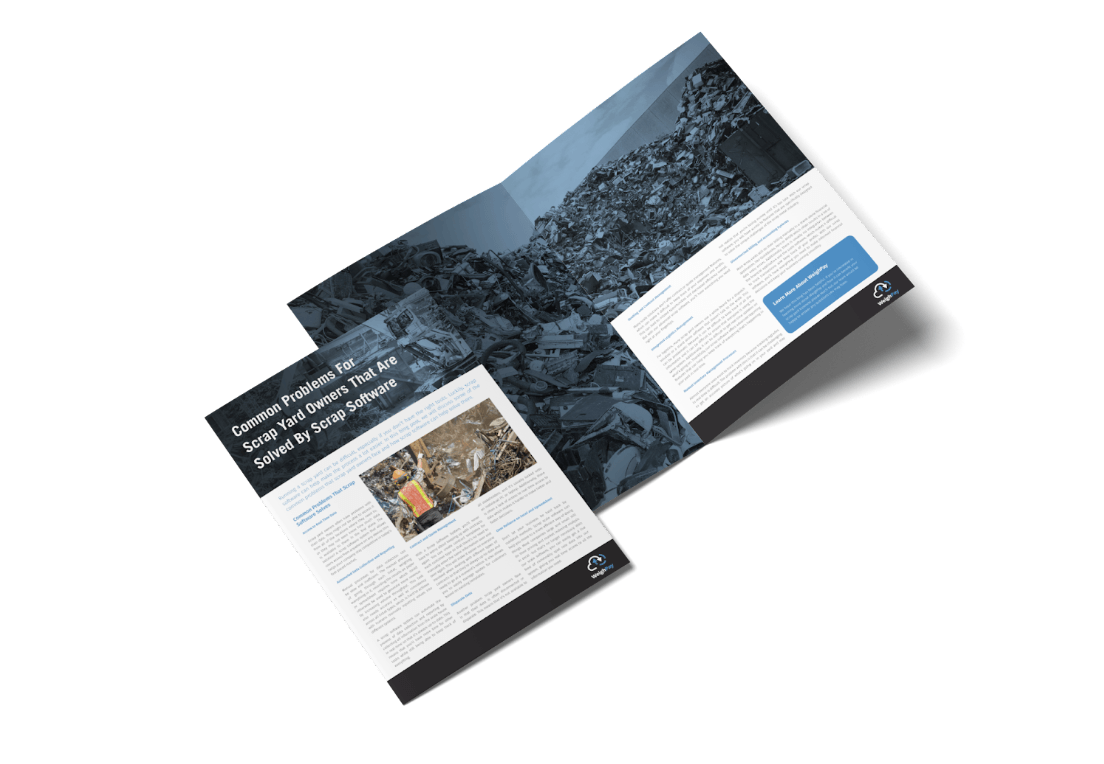
How Can Content Marketing Help NetSuite Partners?
There are numerous benefits that NetSuite partners can experience by using content marketing as part of their overall marketing strategy, including:
- Increasing brand awareness
- Generating leads
- Establishing thought leadership within a specific industry
- Building relationships with potential customers
Let’s take a more in-depth look at each of these benefits:
Increasing Brand Awareness
One of the most important goals of content marketing is to increase brand awareness and reach new audiences. By creating high-quality, informative content that is optimised for search engines, NetSuite partners can ensure that their brand is being seen by people who are interested in what they do.
And the more eyeballs that see your content, the more likely it is that you’ll generate leads and grow your business.
Generating Leads
Content marketing can also be used to generate leads for your NetSuite business. By including strong calls-to-action (CTAs) in your content, you can encourage readers to take the next step and get in touch with your sales team or request a demo.
This is an extremely effective way to generate quality leads that are more likely to convert into paying customers.
Establishing Thought Leadership
Another benefit of content marketing for NetSuite partners is that it can help to establish thought leadership within a specific industry. You can position yourself and your business as leaders in your field by sharing your expert knowledge and insights through high-quality blog posts, articles, and whitepapers.
This is an excellent way to build trust and credibility with potential customers and differentiate yourself from the competition as experts in a particular micro-vertical or field.
Building Relationships
Finally, content marketing can also be used to build relationships with potential customers. By providing them with valuable, informative content, you can start to develop a rapport and establish trust. This is an essential step in the sales process and will help to increase the likelihood of customers doing business with you.
Content Marketing Segmented by Type
There are many different types of marketing content that can be used to attract leads and grow your business. Some of the most popular types include:
Blog Posts
A blog post is a short article (ideally between 1000 and 1,500 words depending on the target keyword) that covers a specific topic in detail. Blog posts are an excellent way to share your expert knowledge and insights on a particular subject.
Articles
An article is similar to a blog post but tends to be longer (between 1,500 and 2,500 words) and more in-depth. Articles typically cover complex topics or provide an in-depth analysis of a particular subject.
Ebooks
An ebook is a longer, more comprehensive guide that covers a specific topic in great detail (usually between 5,000 and 10,000 words). Ebooks are generally used as lead generation tools and can be gated behind a form that requires contact information from the reader.
White Papers
A white paper is a long-form piece of content (between 2,000 and 5,000 words) that covers a specific topic in detail. White papers are typically used to share research or provide an in-depth analysis of a particular subject, usually with the added element of researched statistics and industry consultation.
Infographics
An infographic is a visual representation of data or information. They are typically used to make complex topics more digestible and easy to understand. Infographics are also a great way to gain valuable backlinks to your website, as this type of content is the most commonly referenced type of marketing content from other writers.
How-To Guides
A how-to guide is a step-by-step guide that covers a specific topic in detail. How-to guides are usually between 1,000 and 2000 words long and aim to provide in depth coverage of a specific topic or subject.
Social Media Posts
Social media posts are short updates (between 100 and 200 words) that can be used to share news, announcements, or interesting information with your followers on social media. Coupling the content side of posting with on-brand, high-quality, and clickable images is one of the easiest and most effective ways of gaining new traffic to your website.
Content Marketing Segmented by Application
Lead Generation
The primary goal of lead generation content is to collect leads through the use of forms, such as an ebook that requires contact information to be downloaded. Implementing gated content on your website is imperative to ensuring your traffic can convert into leads.
Building Awareness
The goal of awareness content is to make sure your business is known to your target prospects so when they begin the process of searching for a NetSuite partner, or ERP solution in general, that your business is top of mind. Thought leadership articles and blog posts are examples of content intended to build awareness.
Product Consideration
The goal of consideration content is to help potential customers understand the features and benefits of a particular product or service. At this stage of the marketing lifecycle, content should be focused on helping the prospects compare and contrast different options to make an informed decision. Product comparisons, case studies, and webinars are examples of content that would be used during the consideration stage.
Decision Making
The goal of decision content is to help potential customers make a purchase decision. Purchasing software is a big decision for any business, so content at this stage should be focused on providing the information necessary to help prospects make an informed decision. The most effective content during the decision stage includes pricing pages, ROI calculators, and customer success stories.
Customer Acquisition
The goal of customer acquisition content is to help new customers get started with a particular product or service. This type of content is typically used after a purchase has been made and is focused on helping the customer get the most out of the product or service. Examples of content designed to be consumed during the customer acquisition phase include "getting started" guides, how-to articles, and video tutorials.
Customer Retention
Customer retention content aims to keep existing customers engaged with a product or service. This type of content is typically focused on providing tips, tricks, and helpful information that will help customers get the most out of the product or service.
Top Tips for Getting Started with Content Marketing for NetSuite Partners
If you’re looking to get started with content marketing, here are some top tips:
1. Define Your Goals
Before you start creating content, it’s important to define your goals. What do you want to achieve with your content marketing? Are you looking to generate leads, build awareness, or drive sales? Once you know your goals, you can create content that is aligned with those goals.
2. Know Your Audience
Creating content without knowing your audience is like shooting in the dark. You might hit the target, but it’s more likely that you’ll miss. To create content that resonates with your audience, you need to understand who they are, what they want, and their pain points. Once you know your audience, you can create content that speaks to them directly.
3. Consider Your Format
There are a variety of content formats that you can use to reach your audience. Some of the most popular formats include social media posts, blog posts, articles, ebooks, infographics, and videos. Consider what will work best for your audience and goals when deciding on a format.
4. Plan Ahead
Creating quality content takes time. If you want to be successful with content marketing, you need to plan ahead and create a content calendar. This will help you stay on track and ensure that you’re creating the right kind of content for your audience.
5. Promote Your Content
Just because you create it, doesn’t mean they will come. In order for your content to be successful, you need to promote it. You can promote your content in various ways, including social media, email marketing, and paid advertising.
6. Measure Your Results
Content marketing is not a one-and-done deal. In order to see success, you need to measure your results and track your progress. This will help you determine what’s working and what’s not so that you can adjust your strategy accordingly. That being said, it's easy to get caught up in vanity metrics when measuring campaign performance. At SaaSMouth, we measure the success of our campaigns by two key metrics:
- Website Traffic from Content Source
- Leads Generated by Traffic from Content Source
Content marketing is a powerful tool to help you achieve your business goals.
Following these tips, you can start content marketing and set yourself up for success.
How much content should you be producing and releasing?
The answer to this, in our opinion, is "as much as you can as quickly as you can". The reason is that the more quality content you can produce on as many topics as possible, the more likely it is that one or more pieces will find traction, get in front of the right person at the right time, and start generating leads for your business.
At SaaSMouth, we provide a turnkey monthly content marketing service for NetSuite Partners. This includes creating high-quality social media posts and graphics along with long-form articles and marketing content that speak to our clients' expertise for both NetSuite-related services and their target micro-verticals.
How do you know if your content is any good?
There are 4 main elements to consider when reviewing your content before launch. These include:
Content Quality
Quality content is content that is well researched, well written, provides value to the reader, and answers their questions about a specific topic. It should be free of grammar and spelling errors, and it should be clear and concise. Quality content is also evergreen, meaning that it will be relevant for months or even years to come, which has a big impact when measuring the success of each piece of content over an extended period of time.
Optimised for Search Engines
It's important to ensure that your content is optimised for search engines so that people can easily find it when searching for information related to your topic. This includes using relevant keywords throughout your content, as well as including links to other helpful resources, ensuring on-page SEO has been implemented, such as correct usage of heading tags and inclusion of a carefully planned meta title and description.
Topically Clustered
Having a plan in place about the categories of topics you will be creating content for is a powerful way to drive your content calendar planning and ensure you are covering the full spectrum of the products and services you want to promote. Writing about something once and never revisiting it limits your ability to convince Google you are an authority on that topic, which means your ability to rank for both articles and core landing pages will be lower.
DUST Free
DUST detection is a key part of Google's ranking algorithm. DUST stands for Duplicate URL Same Text and is one of the biggest mistakes we see clients make when it comes to content creation. At its core, the Google Algorithm rewards pages that contain content that provides deep coverage of a particular topic, is unique and free from plagiarism, and that has not been seen anywhere else on the internet. This includes media files on your website, such as PDFs. To ensure your best chance of ranking, your content should be completely original, not copied from other sources such as NetSuite direct website or existing brochures and articles.
The Challenges in Creating NetSuite-Focused Content
NetSuite is a complex and feature-rich system that can be implemented into a huge range of industries, each with specific solution requirements, pain points, and key drivers. This can make it difficult to produce content that is truly helpful and relevant to your target market without coming across as too "salesy" or self-promotional.
It's important to focus on the needs of your target market and what they are trying to achieve with NetSuite within their business. For example, if you are targeting the retail industry, your content might be focused on how NetSuite can help businesses streamline their operations, improve customer service or save money on inventory management whilst supporting an omni-channel strategy.
If you are targeting the manufacturing industry, your content might focus on how NetSuite can help businesses manage their supply chain more effectively, reduce production costs or improve quality control.
When speaking with NetSuite Partners, we often hear that in the past, they have tried using different marketing and content agencies but found that the content that was produced was too generic, incorrect, or not aligned with the needs of their target industries.
That's why we created SaaSMouth. Our team of NetSuite experts has in-depth knowledge of the platform and understands how it can be applied across different industries to achieve specific business objectives. We aim to provide our clients with a low-touch, high-impact marketing automation service that supports their lead generation efforts with minimal client time impacts.
If you struggle to produce quality, consistent, and frequent content that resonates with your audience and drives results for your business, get in touch with us today to see how we can help.
Interested in Working With Our NetSuite Content Marketing Pros?
If you're looking for help with your NetSuite Partner content marketing, be sure to check out SaaSMouth! Whether you want to refresh and upgrade your existing website, need articles written, or want help with a more holistic marketing strategy, we are here to help.
We hope you found this article helpful. These are just a few tips to get you started on your content marketing journey - there's a lot more to it than what we've covered here, so if you would like to book a free 30-minute conversation, feel free to book some time in my calendar.
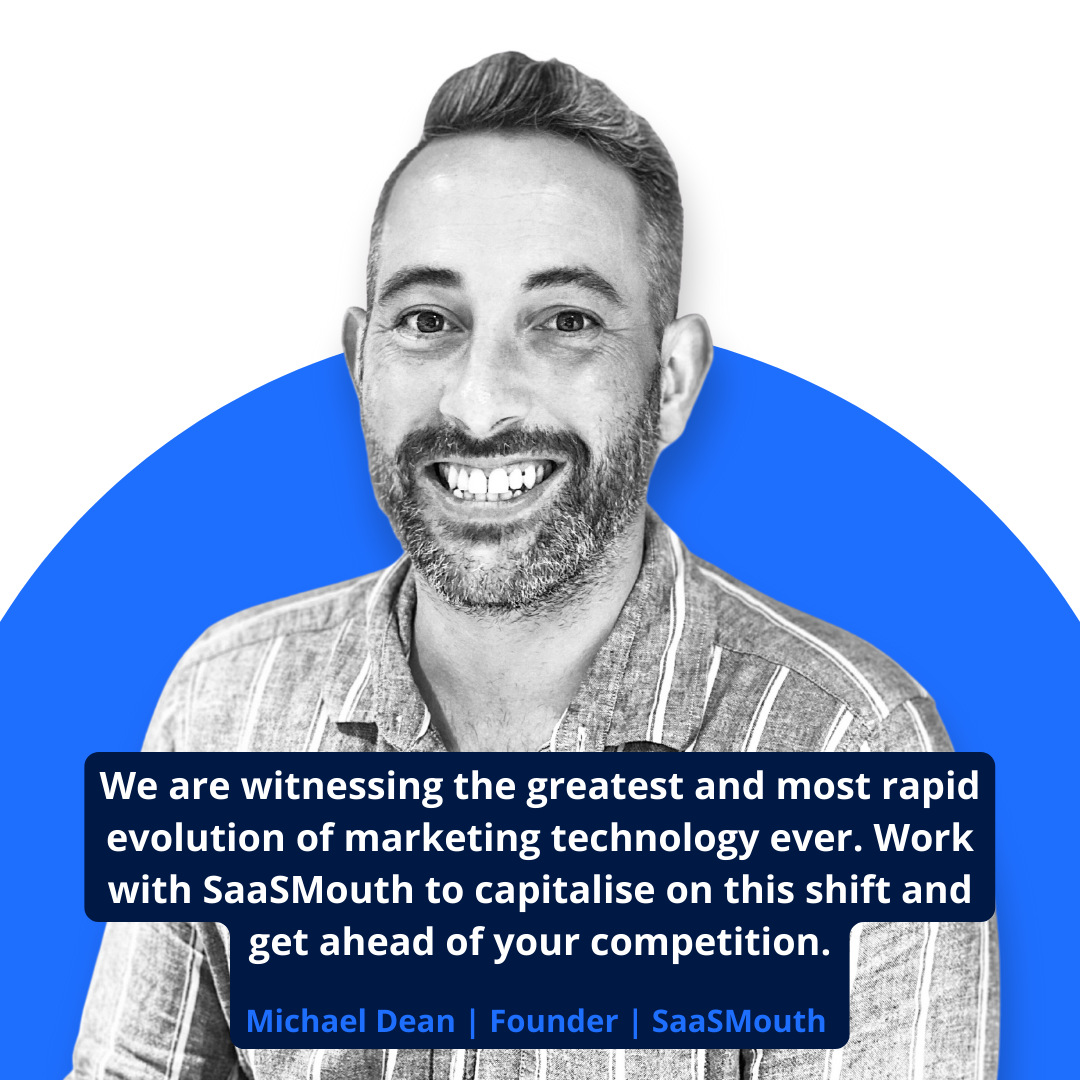
Let's Connect
Michael Dean
Head of Content & Founder, SaaSMouth
Michael Dean is the founder of SaaSMouth, a cutting-edge digital marketing agency dedicated to empowering SaaS companies and ERP partners with the power of AI, automation, and generative technologies. With twenty years of experience in digital marketing and ERP sales, Michael has developed a deep understanding of the unique challenges faced by SaaS Software vendors and ERP resellers and has devoted his career to creating innovative solutions that help them thrive in the digital space.
Recognising the immense potential of artificial intelligence and automation in marketing, Michael founded SaaSMouth to bridge the gap between traditional marketing approaches and the rapidly evolving landscape of the software industry.
Under Michael's leadership, SaaSMouth has become a pioneer in its field, leveraging state-of-the-art AI-driven tools to provide personalised, data-driven marketing solutions that maximise ROI and drive exponential growth for clients.

